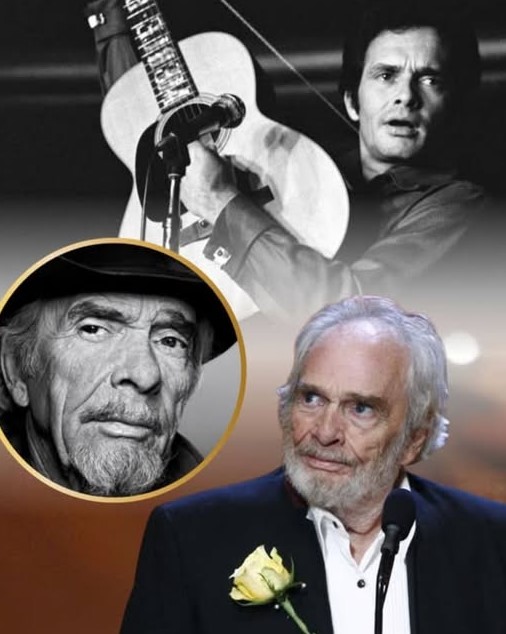
The Poet of the Common Man
Few artists have ever captured the soul of America’s working class like Merle Haggard. His songs were more than melodies — they were truthful confessions drawn from a life marked by hardship, rebellion, redemption, and grace. Born on April 6, 1937, in Oildale, California, Haggard’s story began in the dust and sweat of a blue-collar town, where music wasn’t a luxury — it was survival.
He grew up listening to Jimmie Rodgers and Bob Wills, but he didn’t just imitate them. He absorbed their stories and reshaped them through his own lens. Every lyric Merle wrote came from the dirt beneath his boots and the calluses on his hands. For millions, his voice became the sound of real country music — honest, unfiltered, and unapologetically human.
From Outlaw to Legend
Haggard’s life could have ended long before it began. As a teenager, he found himself behind bars more than once, lost in a world of petty crime and bad choices. But it was San Quentin Prison that became the unlikely birthplace of his musical resurrection.
Behind those walls, he saw Johnny Cash perform live, and that moment changed him forever. Music became his escape — and later, his redemption. By the time he was released, Haggard was no longer a lost boy; he was a man determined to carve his story into the heart of country music.
His early songs like “Sing Me Back Home,” “Branded Man,” and “Mama Tried” weren’t fictional tales. They were reflections of his own pain and guilt — written with the precision of a poet and the rawness of a man who’d lived every word.
The Voice That Defined a Generation
When Merle Haggard sang, you didn’t just hear the lyrics — you felt them. His voice carried a timeless weight, the sound of someone who’d known both sin and salvation. Whether he was singing about freedom, heartbreak, or the struggles of the working class, Haggard spoke to people who felt unseen.
His anthem “Okie from Muskogee” became one of the most defining songs in American history. It wasn’t just a hit — it was a cultural statement. While some saw it as patriotic defiance, others saw it as satire. But for Merle, it was simply another chapter in his storytelling — a mirror reflecting the divided soul of America in the late 1960s.
Other classics like “The Fightin’ Side of Me” and “Workin’ Man Blues” showcased his deep respect for ordinary Americans who built their lives on sweat and perseverance. Through every verse, he reminded listeners that dignity isn’t measured in fame, but in effort.
Merle Haggard and the Art of Real Country
In an era when country music often drifted toward pop sensibilities, Haggard remained anchored in authenticity. His sound — a seamless blend of honky-tonk, western swing, and barroom balladry — defined what it meant to be true country.
He wrote about broken hearts and broken systems, about love, loss, and longing. Songs like “If We Make It Through December” and “Silver Wings” captured emotional landscapes that few artists could translate so beautifully. His ability to fuse melancholy with melody made him one of the greatest songwriters in American history.
Merle didn’t chase trends; he created them. He stood for something rare in music — integrity. And that’s why, decades after his first hit, his songs continue to resonate with both old fans and new listeners discovering what real storytelling sounds like.
A Life Written in Songs
Every line Haggard penned was part of a lifelong autobiography. His discography reads like chapters in an epic novel — from the prison bars of his youth to the bright lights of the Grand Ole Opry.
Over the course of his career, he recorded more than 70 albums and 38 No. 1 hits, earning a place among the giants of country music. But numbers alone can’t measure Merle’s impact. His music didn’t just entertain — it educated, comforted, and united. He gave a voice to those who had none.
He collaborated with legends like Willie Nelson, George Jones, and Johnny Cash, yet he always maintained his individuality. Haggard was both a rebel and a philosopher — a man whose wisdom was forged in the fire of real experience.
The Final Verse: April 6, 2016
On his 79th birthday, Merle Haggard took his final bow. The symbolism was poetic — the man who wrote his life in song had finished it on the same day it began. His passing wasn’t an end; it was a transition into country music immortality.
Fans around the world mourned, but they also celebrated the legacy of authenticity he left behind. His music continues to echo in small-town bars, long highways, and hearts that still believe in real stories told by real people.
When Haggard once sang, “The roots of my raisin’ run deep,” he wasn’t exaggerating. Those roots now nourish every artist who values honesty over glamour, grit over gloss, and truth over pretense.
The Legacy That Will Never Fade
Merle Haggard didn’t just influence country music — he defined it. His songs remain timeless reminders that art means more when it comes from lived experience. He embodied the essence of American storytelling: flawed, beautiful, and fiercely real.
Even years after his passing, new generations continue to discover his music and find themselves reflected in his words. That’s the true mark of a legend — when the voice of one man becomes the conscience of a nation.
Merle Haggard wasn’t just a singer. He was the poet laureate of the common man, a rebel whose truth outlived him.
And though the final verse of his life has been sung, the melody of his legacy will echo forever — in every heart that still believes country music should tell the truth.